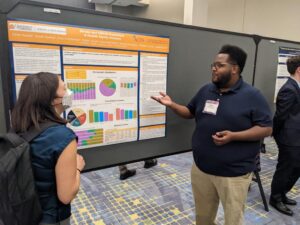
Assefa presents his findings at ACT 22
“It’s not something I thought I would be doing at this point” proclaims a smiling Ethan Assefa when asked about his upcoming poster presentation at the 2022 Association of Clinical and Translational Science (ACTS) meeting. Assefa will present his research to a national audience of trainees, educators, researchers, physician investigators, and other health professionals engaged in clinical and translational science. Truly a highlight for any researcher, especially for such a young one.
Assefa, a recent graduate of UVA, participated in the UVA-Historically Black Colleges and Universities Summer Research Bridge to Data Science program (Bridge) as a research fellow. This program is co-sponsored by integrated Translational Health Research Institute of Virginia (iTHRIV), the UVA School of Data Science (UVA SDS), Oracle, and Deloitte. According to the UVA SDS, the UVA-HBCU Summer Research Bridge to Data Science program brings together a diverse team of highly-motivated students and researchers to address fundamental questions in health equity in Charlottesville and Albemarle communities. Deloitte and Oracle provide participating students with mentorship and educational materials on data science and artificial intelligence, as well as career development resources ranging from a monthly speaker series to capstone engagement and virtual job shadowing.
In this program, Assefa and other participants used data analysis and visualization techniques to explore health equity related topics. Assefa and several partners focused on issues related to stroke and COVID. “Our research was essentially a health equity analysis of a population of patients with concurrent ischemic stroke and COVID positivity. We wanted to see whether they had parity of care across race/ethnicity.” The team hypothesized that there would be a disparity in patient care. To test their hypothesis, the team accessed data from the National COVID Cohort Collaborative (N3C), an analytics platform containing clinical data from the electronic health records from over 72 sites around the country. This data from COVID positive patients (and matched controls) helps scientists further understand the disease, including potential risk factors, protective factors, and long-term health consequences, as well as other issues concerning COVID. Coding in N3C requires that researchers learn novel software interfaces and workflows, and often even new languages that support distributed computation.
The Bridge student team was oriented to the N3C Enclave with the help of N3C Logic Liaisons, led by iTHRIV’s Director of Informatics and Bridge project mentor, Johanna Loomba. “It was an honor to support these students in their exploration of the data and learning what questions were appropriate to ask of this type of observational data. They exhibited the patience and critical thinking that are essential to good data analytics.”
Assefa insists he “couldn’t imagine getting through the project without the help of everyone involved at iTHRIV. Johanna, in particular, would come to meetings and give her guidance as well. Her knowledge and expertise regarding the Enclave and Palantir systems where our data were stored was essential when we were first getting started.”
The team spent several weeks collecting and analyzing the data. What Assefa and his teammates found was surprising. “Anyone looking at the national COVID mortality rates could tell there was a racial disparity but for some reason, those patterns weren’t appearing in our [stroke and COVID-19] data.” What their data did reveal is that there is a significant association between insurance status and extracorporeal membrane oxygenation (ECMO) treatment, with Medicaid patients having significantly lower odds of receiving that particular treatment.
Follow up analysis by the team showed the largest proportion of Medicaid patients were Black/African-American non-Hispanic. “So, the racial disparity was there, it was just interrelated with socio-economic status and required some further digging to reveal itself” explains Assefa.
With the 2022 ACTS meeting and his presentation fast approaching, Assefa remains contemplative. Reflecting on his experience with the Bridge summer program, remarking “the actual process of research, it is not as clean and formulaic as they teach you in class. Real data is messy and at times, so is data analysis, but there is a cathartic sense of satisfaction to creating some order out of the chaos.”
iTHRIV is a cross-state translational research institute that combines the expertise of clinical translational biomedical researchers and data scientists to create infrastructure and investigator resources for using data to improve health across the Commonwealth of Virginia. Partner sites include the University of Virginia, Virginia Tech, Carilion Clinic and Inova Health System. iTHRIV is funded by the National Center for Advancing Translational Sciences, part of the National Institutes of Health, under award UL1TR003015 and KL2TR003016.
On a final note, Assefa wishes to express gratitude to his teammates:
“I am so glad to have had this opportunity to meet and work with some amazing, erudite scholars and peers from fellow institutions. My teammates included Esau Hutcherson from Howard University, Dahnielle Milton and Suliah Apatira from Spelman College, and Rehan Javaid from the University of Virginia. Over the summer, I got to know them over multiple weekly Zoom calls and daily messages, we collaborated together to clean data and run statistical analyses, we joked around and learned about each other, we presented our work together and I am very lucky that I got to be a member of this team alongside them.”
Filed Under: Research
